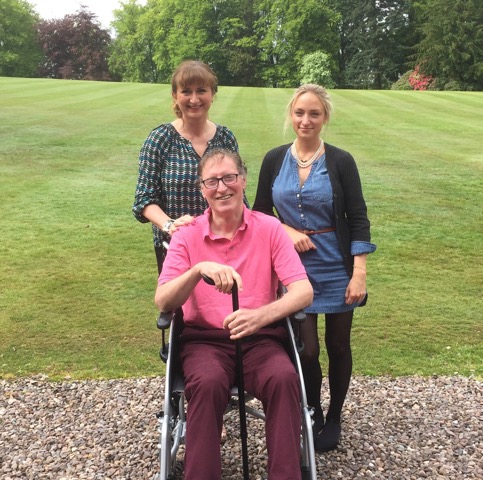What is MND
Find support
I have MND
I am supporting someone
Get involved
Research
About MND Scotland

“Death Sits on My Shoulders” is the story of Richard’s life with MND, starting before his diagnosis in March 2015. It honestly describes the physical and emotional challenges that come with a terminal diagnosis and, despite the title, how Richard has tried to meet these challenges with as much humour and positivity as possible.
MND is a progressive terminal illness which prevents signals from the brain reaching the muscles. This can cause someone to lose the ability to walk, eat, speak and breathe unaided.
Richard said “My journey with MND began some time before I knew it. The book begins five years ago, when a glass of beer slipped through my fingers. It then describes how, after many medical appointments, scans, and tests, my self-diagnosis was confirmed, three years later.
“After the shock of diagnosis, the story covers the inevitable losses that come with this appalling disease, and the physical and emotional challenges that each loss brings. At first, these are gradual, and include my lack of mobility, the deterioration of my speech, and the growing stiffness of my limbs.
“As my symptoms worsen, the book describes how I have to surrender my driving licence, accept an electric wheelchair, and increasingly live life in my head. It also covers the happiness I find during my hospice visits, the kindness shown by my team of carers, and the despair I feel at knowing that I will never walk again, nor spend another night in bed with the woman I love.
“After surviving a bout of pneumonia, during which I feared the worst, the book ends with me feeling guilty for having outlived many of my fellow sufferers, but still glad to be alive.”
Richard, who worked in Edinburgh as an economics teacher for 35 years, retired in 2009 and moved to Perth with his wife, Elaine, in 2015. The couple married in 2011 and between them have five children. Richard has two daughters, Lorna (38) and Megan (25), as well as three step-children.
Richard recalls watching the film “The Theory of Everything” before his diagnosis in March 2015 and realising the similarities, “While watching the film it dawned on me, ‘I have Motor Neurone Disease. I have what Stephen Hawking has.’ It started in the exact same way, fumbling with my hands and unable to grasp objects – I just knew.”
He continued, “The initial news was shattering for the whole family, but also a relief for me. The confirmation of knowing what I have is better than the uncertainty of having no diagnosis.
“After the shock of my original diagnosis, I found that expressing my feelings, rather than bottling things up, helped me to come to terms with things. This is why I started writing my blog and was surprised by the number of people that responded to my posts. I realised that by turning it into a book I had an opportunity to reach a wider audience. Writing has given me a focus that I doubt I would have found by any other means.
“I hope the book will help people better understand what having a progressive and terminal illness such as MND is like, and to appreciate that despite the huge emotional challenges that come with it, those affected by such a condition still have a voice. I also hope it will raise some money for MND research.”
Craig Stockton, CEO of MND Scotland, said, “Richard’s positive approach to his devastating diagnosis is truly inspirational. I hope that others in a similar situation will take some comfort from Richard’s words. The money raised from his book will help take us closer to the day we discover a cure for MND and we are so grateful for his support.”
Richard’s book is available on Kindle and in hard copy via Amazon.
Sign up
for newsletter
Get the latest news and events straight to your inbox.
You can help create a world without MND